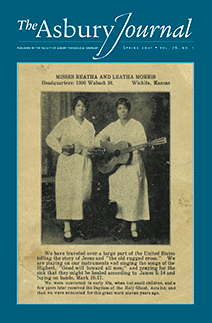Updates, Events, and Publications
 Alumni and former director of communications at Asbury Theological Seminary Scott Burson has written a book titled All about the Bass: Searching for Treble in the Midst of a Pounding Culture War. Now a professor of philosophical theology at Indiana Wesleyan University, Dr. Burson’s new book will be released in May 2021.
Alumni and former director of communications at Asbury Theological Seminary Scott Burson has written a book titled All about the Bass: Searching for Treble in the Midst of a Pounding Culture War. Now a professor of philosophical theology at Indiana Wesleyan University, Dr. Burson’s new book will be released in May 2021. ALUMNUS PUBLISHES BOOK ENCOURAGING CHURCHES TO LIVE INTO THEIR PURPOSE (DIGITAL COPY NOW AVAILABLE)
 Craig D. Taylor (D.Min. — Asbury Theological Seminary) has served in pastoral ministry in Maryland, Maine, and Delaware. He currently teaches Apologetics, Current Events, Crossing Cultures, and Senior Thesis at Delmarva Christian High School and is a dissertation coach for Asbury Theological Seminary.
Craig D. Taylor (D.Min. — Asbury Theological Seminary) has served in pastoral ministry in Maryland, Maine, and Delaware. He currently teaches Apologetics, Current Events, Crossing Cultures, and Senior Thesis at Delmarva Christian High School and is a dissertation coach for Asbury Theological Seminary.
Greenhouses have a rich history. They have a noble beginning as well. According to Pliny the Elder, when royal physicians informed the emperor Tiberius in first century Rome that he should eat a cucumber a day, construction began on a special house for plants. The material for the roof allowed sunlight to enter and the walls of stone permitted heat from fires outside to warm the air inside. This  early greenhouse assured a continual supply of cucumbers, which in turn preserved the health of the ruler of the Roman Empire.
early greenhouse assured a continual supply of cucumbers, which in turn preserved the health of the ruler of the Roman Empire.
Since the first century, greenhouses have continued to evolve. Materials such as glass, fiberglass, and plastic have replaced the stone walls and early roof made from mica or selenite. Contemporary heating systems, fans, and computers are now available to maintain the correct air temperature for a plethora of crops. The physical materials, construction methods, and techniques have changed over the years; however, the purpose has remained the same.
We still need greenhouses to ensure a continual supply of certain crops. With the aid of a greenhouse, a gardener can determine the temperature and humidity that the plants need. The greenhouse offers a place of protection. Although careful maintenance is still required, a greenhouse aids in the development of desired outcomes.
The local church has significant correlations to a greenhouse. The local church was born to be a place where God’s people grow. The King of Kings ushered in the church to not only protect his children from false teachers, but also to feed his sheep. Over the years, the physical shape of the church building has changed. Bricks, mortar, and steel have replaced the open fields and tents where people used to gather to hear the Word. Contemporary sound and lighting systems have replaced the simple amenities of house churches. The purpose of the local church, however, remains unchanged. The local church is still the place where God’s people grow to become spiritual leaders.
The book is published through Parson’s Porch Books, which functions as a ministry that uses profits to help the poor. The book costs $19.95 and may be purchased in the bookstore at parsonsporch.com or on Amazon here. A digital copy of the book is now available here.
NEW SPRING ISSUE OF THE ASBURY JOURNAL IS RELEASED

The Asbury Journal publishes scholarly essays and book reviews written from a Wesleyan perspective. The Journal’s authors and audience reflect the global reality of the Christian church, the holistic nature of Wesleyan thought, and the importance of both theory and practice in addressing the current issues of the day. Authors include Wesleyan scholars, scholars of Wesleyanism/Methodism, and scholars writing on issues of theological and theological education importance.
Check out the newest edition of the journal—Volume 76, Number 1 (2021).
APPLY FOR THE NEW CHURCH PLANTING FELLOWSHIP 
The Church Planting Initiative is excited to partner with church planters who are engaging in new, innovative approaches to church planting in the 21st century. Each year, we will select qualified church planters to be a part of our fellows’ program. As a fellow, you will be a part of a one-year cohort with other planters from a variety of contexts and backgrounds. You will receive grant funding of up to $5,000, enjoy free resources, and receive regular coaching calls from an expert in a contextually appropriate area. If God is calling you to plant a church and you are in the first 1-3 years of planting a new church and desire to become a church-planting fellow, then we invite you to apply for our next cohort of Church Planting Fellows! Applications for the 2021-2022 cohort are due June 4, 2021.
To learn more and apply visit here.
ALUMNUS’ NEW BOOK EXPECTED TO RELEASE IN MAY 2021

Dr. Samuel Naaman, DMiss ’99, is excited to announce the release of his new book entitled God of the Impossible: Stories of Hope from the Muslim World. Here is a short introduction to the work: “Sharing the gospel with those from different cultures and belief systems can sometimes seem futile, especially when it comes to reaching Muslims. The gap between Christianity and Islam is vast, and bridging cross-cultural values can seem impossible. In God of the Impossible: Stories of Hope from the Muslim World, you’ll be stirred by amazing testimonies of people from a Muslim background coming to personal faith in Jesus Christ.” You can preorder the work now as it is not expected to be released until May 4, 2021. For more information, visit the publishers website here.






Leave a Reply